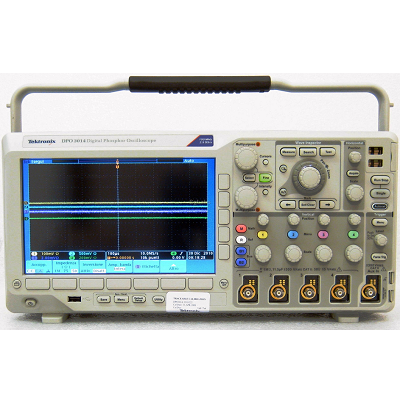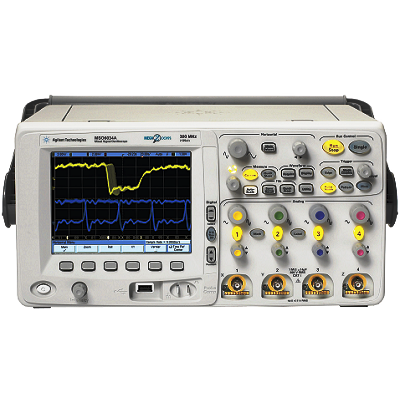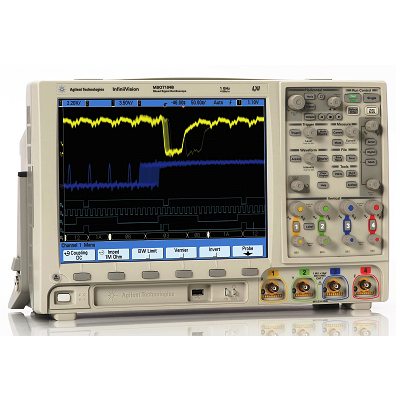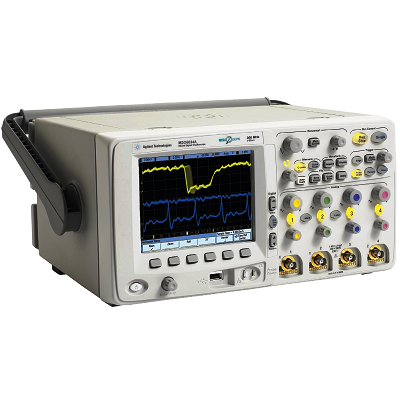Tektronix TDS5032B 2 Channel 350 MHz Digital Oscilloscope 5 GSa/s
Description
The TDS5000B Series offers the industry’s first easily customizable oscilloscope user interface. MyScope control windows is a revolutionary new feature that allows you to build your own control windows with only the controls, features, and capabilities that you care about and are important in your job. For the first time, you can pull all the functionality you need from all the various parts of the oscilloscope into one control window, effectively creating your own personalized “toolbox” of oscilloscope features. No longer do you need to search through menus for features or re-learn how to drive the oscilloscope after a break from the lab.
MyScope control windows enable you to spend your valuable time focused on the task at hand rather than navigating menus on your oscilloscope. And creating these custom control windows isn’t a long drawn-out or complex process. They are easily created in a matter of minutes using a simple, visual, drag and drop process. Once created, these custom control windows are easily accessed through a dedicated MyScope button and menu selection on the oscilloscope button/menu bar, just like any other control window. You can make an unlimited number of custom control windows, enabling each person who uses the oscilloscope, in a shared environment, to have their own unique control window. Since the control windows are stored as files on the hard drive, they can easily be transferred to other TDS5000B Series oscilloscopes, or they can even be e-mailed to a co-worker around the world when the need arises. MyScope control windows will benefit all oscilloscope users, from eliminating the ramp-up time that many face when returning to the lab after not using an oscilloscope for a while, to the power user who can now operate far more efficiently. Everything you need is found in one control window rather than having to constantly navigate through menu after menu to repeat similar tasks.
Features
- 500 and 350 MHz Bandwidth Models
- 2 and 4 Channel Models
- 5 GS/s Sample Rate
- Up to 16 M Record Length
- 100,000 wfms/s Maximum Waveform Capture Rate
- MyScope™ Custom Control Windows Enhance Productivity
- Right-Mouse-Click Menus for Exceptional Efficiency
- OpenChoice® Platform with Windows 2000 Delivers Built-in Networking and Analysis
- Small Footprint/Lightweight
- 10.4 in. Bright Display
- Suite of Advanced Triggers
- Communication Mask Testing
- Pass/Fail Limit Testing
- Remote Viewing and Control
- E-mail on Event
- CD-RW Drive
- Built-in Printer (Optional)
- Interoperability with Tektronix Logic Analyzers
- GPIB Controller
Tektronix TDS5032B Applications
- Digital Design and Debug
- Mask Testing for Telecomm/Datacomm/Video Standards
- Investigation of Transient Phenomena
- Power Measurements
- Video Design and Debug
- DVD, Jitter and Timing, Spectral Analysis
- Automotive Electronics
- Manufacturing Test
- Electro-mechanical
- Bio-medical
- Industrial Control
Specifications
Vertical System
|
TDS5032B |
TDS5052B / TDS5054BE |
|
|
Input Channels |
2 |
2/4 |
|
Analog Bandwidth (-3 dB) 5 mV/div – 1 V/div |
350 MHz |
500 MHz |
|
Calculated Rise Time 5 mV/div (typical) |
1.15 ns |
800 ps |
|
Hardware Bandwidth Limits |
150 MHz or 20 MHz |
|
|
Input Coupling |
AC, DC, GND |
|
|
Input Impedance, 1 MΩ |
±1% |
|
|
Input Impedance, 50 Ω |
±1% |
|
|
Input Sensitivity, 1 MΩ |
1 mV/div to 10 V/div |
|
|
Input Sensitivity, 50 Ω |
1 mV/div to 1 V/div |
|
|
Vertical Resolution |
8-bits (>11-bits w/ averaging) |
|
|
Max Input Voltage, 1 MΩ |
150 V CAT I, ≤ 400 V peak. Derate at 20 dB/decade to 9 VRMS above 200 kHz |
|
|
Max Input Voltage, 50 Ω |
5 VRMS with peaks <±30 V |
|
|
DC Gain Accuracy |
1.5% with offset set to 0 V |
|
|
Offset Range, 1 MΩ |
1 mV/div – 99.5 mV/div ±1 V 100 mV/div – 1 V/div ±10 V 1.01 V/div – 10 V/div ±100 V |
|
|
Offset Range, 50 Ω |
1 mV/div – 99.5 mV/div ±1 V 100 mV/div -1 V/div ±10 V |
|
|
Channel-to-channel Isolation for Any Two Channels at Equal Vertical Scale |
≥100:1 at ≤100 MHz and ≥30:1 at >100 MHz up to the rated bandwidth |
|
Timebase System
|
Timebase Range |
200 ps/div to 1000 s/div |
|
Timebase Delay Time Range |
(s/div × 10) to 1000 s |
|
Channel-to-channel Deskew Range |
±75 ns |
|
Timebase Accuracy |
15 ppm |
|
Delta Time Measurement Accuracy |
(0.06/sample rate + 15 ppm × |Reading|)RMS |
|
Trigger Jitter (RMS) |
8 psRMS (typical) |
|
Long Term Sample Rate and Delay Time Accuracy |
±15 ppm over any ≥1 ms interval |
Acquisition System
|
|
TDS5032B / TDS5052B |
TDS5054BE |
|
Real-time Sample Rates |
||
|
Channel (max) |
5 GS/s |
1 GS/s |
|
2 Channels (max) |
2.5 GS/s |
1 GS/s |
|
3-4 Channels (max) |
— |
1 GS/s |
|
Equivalent Time Sample Rate (max) |
250 GS/s |
200 GS/s |
|
Maximum Record Length per Channel with Standard Memory |
8M/4M/– |
8M/4M/2M |
|
With Opt. 3M |
16M/8M/– |
16M/8M/4M |
Maximum Duration at Highest Real-time Resolution (1 ch)
|
|
TDS5054BE |
All Other Models |
|
Time Resolution (single shot) |
1 ns (1 GS/s) |
200 ps (5 GS/s) |
|
Max Duration with Standard Memory |
8 ms |
1.6 ms |
|
Max Duration with Opt. 3M |
16 ms |
3.2 ms |
Acquisition Modes
|
FastAcq Acquisition |
FastAcq optimizes the instrument for analysis of dynamic signals and capture of infrequent events. Maximum FastAcq waveform capture rate is 100,000 wfms/s. |
|
Sample |
Acquire sampled values |
|
Peak Detect |
Captures narrow glitches (<1 ns) at all real-time sampling rates |
|
Averaging |
From 2 to 10,000 waveforms included in average |
|
Envelope |
From 2 to 2 × 109 waveforms included in min-max envelope |
|
Hi-Res |
Real-time boxcar averaging reduces random noise and increases resolution |
|
Waveform Database |
Accumulates a waveform database that provides a three dimensional array of amplitude, time, and counts |
|
FastFrame™ Acquisition |
Acquisition memory divided into segments; maximum trigger rate >225,000 waveforms per second |
Trigger System
|
Sensitivity |
|
|
Internal DC Coupled |
0.35 div DC to 50 MHz increasing to 1 div at rated bandwidth |
|
External (auxiliary input) |
400 mV from DC to 50 MHz increasing to 750 mV at 100 MHz |
|
Main Trigger Modes |
Auto, Normal, and Single |
|
Trigger Sequences |
Main, Delayed by time, Delayed by events. All sequences can include separate horizontal delay after the trigger event to position the acquisition window in time. |
|
Standard Trigger Types |
Edge, Glitch, Runt, Window, Width, Transition Time, Timeout, Pattern, Video, State, Setup/Hold |
|
A Event and Delayed B Event Trigger Types |
|
|
A Event |
All above types |
|
Delayed B Event |
Edge |
|
Communications-related Triggers (requires Option SM) |
Support for AMI, HDB3, BnZS, CMI, MLT3, and NRZ encoded communications signals. Select among isolated positive or negative one, zero pulse form or eye patterns as applicable to standard |
|
Trigger Level Range |
|
|
Any Channel |
±10 divisions from center of screen |
|
External (auxiliary in) |
±8 V |
|
Line |
Fixed at 0 V |
|
Trigger Coupling |
DC, AC (attenuate <60 Hz), HF reject (attenuate >30 kHz) LF reject (attenuates <80 kHz) Noise reject (reduce sensitivity) |
|
Trigger Holdoff Range |
1.5 μs to 12 s maximum |
Trigger Modes
|
Edge |
Positive or negative slope on any channel or front panel auxiliary input. Coupling includes DC, AC, noise reject, HF reject, and LF reject. |
|
Video |
Trigger on NTSC, PAL, SECAM, analog HDTV, and non-standard video formats |
|
Glitch |
Trigger on or reject glitches of positive, negative or either polarity. Minimum glitch width is 1.0 ns with 200 ps resolution. |
|
Width |
Trigger on width of positive or negative pulse either within or out of selectable time limits ranging from 1 ns to 1 s with 200 ps resolution |
|
Runt |
Trigger on a pulse that crosses one threshold but fails to cross a second threshold before crossing the first again. Event can be time or logic qualified (logic on 4 channel models only). |
|
Window |
Trigger on an event that enters or exits a window defined by two user-adjustable thresholds. Event can be time or logic qualified (logic on 4 channel models only). |
|
Timeout |
Trigger on an event which remains high, low or either, for a specified time period, selectable from 1 ns to 1 s with 200 ps resolution |
|
Transition |
Trigger on pulse edge rates that are faster or slower than specified. Slope may be positive, negative or either |
|
Setup/Hold |
Trigger on violations of both setup time and hold time between clock and data present on any two input channels |
|
Pattern |
Trigger when pattern goes false or stays true for specified period of time. Pattern (AND, OR, NAND, NOR) specified for four input channels defined as High, Low or Don't Care. |
|
State |
Any logical pattern of channels (1, 2, 3) clocked by edge on channel 4 (channel 2 on TDS5032B/5052B). Trigger on rising or falling clock edge. |
|
Comm (requires option SM) |
Support for AMI, HDB3, B3ZS, B6ZS, B8ZS, CMI, NRZ and MLT3 encoded communication signals. Select among isolated positive or negative one, zero pulse form or eye patterns as applicable to standard. |
|
Trigger Delay by Time |
16 ns to 250 seconds |
|
Trigger Delay by Events |
1 to 10,000,000 Events |
WAVEFORM MEASUREMENTS
|
Automatic Measurements |
53 of which 8 can be displayed on screen at any one time |
|
Amplitude Related |
Amplitude, High, Low, Maximum, Minimum, Peak to Peak, Mean, Cycle Mean, RMS, Cycle RMS, Positive Overshoot, Negative Overshoot |
|
Time Related |
Rise Time, Fall Time, Positive Width, Negative Width, Positive Duty Cycle, Negative Duty Cycle, Period, Frequency, Delay |
|
Combination |
Area, Cycle Area, Phase, Burst Width |
|
Histogram Related |
Waveform count, Hits in box, Peak hits, Median, Maximum, Minimum, Peak to Peak, Mean (μ), Standard Deviation (σ), μ ± 1σ, μ ± 2σ, μ ± 3σ |
|
Communications Related |
Extinction Ratio (abs, %, dB), Eye Height, Eye Width, Eye Top, Eye Base, Crossing %, Jitter (Pk-Pk, RMS, 6σ), Noise (Pk-Pk, RMS), Signal/Noise Ratio, Cycle Distortion, Q-Factor |
|
Measurement Statistics |
Mean, Min, Max, Standard Deviation, Population |
|
Reference Levels |
User definable for each of the eight measurements |
|
Histograms |
Vertical or horizontal with linear or log scaling |
|
Gating |
Isolate the specific occurrence within an acquisition to take measurements on |
|
Cursors |
Horizontal Bars, Vertical Bars, Waveform, and Screen |
WAVEFORM PROCESSING/MATH
|
Arithmetic |
Add, subtract, multiply, and divide waveforms. |
|
Algebraic Expressions |
Define extensive algebraic expressions including waveforms, scalars, user adjustable variables, and results of parametric measurements e.g. (Integral (Ch1-Mean(Ch1))*1.414*VAR1). |
|
Math Functions |
Average, Invert, Integrate, Differentiate, Square Root, Exponential, Log 10, Log e, Abs, Ceiling, Floor, Min, Max, Sin, Cos, Tan, ASin, ACos, ATan, Sinh, Cosh, Tanh |
|
Frequency Domain Functions |
Spectral magnitude and phase, real and imaginary spectra. |
|
Vertical Units |
|
|
Magnitude |
Linear, dB, dBm. |
|
Phase |
degrees, radians, group delay. |
|
Window Functions |
Rectangular, Hamming, Hanning, Kaiser-Bessel, Blackman-Harris, Gaussian, Flattop2, Tek Exponential. |
|
Limit Testing |
Compare live waveforms against a known “golden” reference waveform with user defined vertical and horizontal tolerances. |
DISPLAY CHARACTERISTICS
|
Display Type |
10.4 in. Liquid crystal active-matrix color display |
|
Display Resolution |
640 horizontal x 480 vertical pixels |
|
Waveform Styles |
Vectors, Dots, Intensified Samples, Variable Persistence, Infinite Persistence |
|
Display Format |
YT, XY, XYZ |
|
Color Palettes |
Individual color palettes for Record View and FastAcq/WfmDB modes include Normal, Green, Gray, Temperature, Spectral, and User Defined |

























